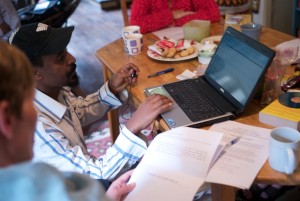
Shirley Lewis generously invited us to tea yesterday (Sunday, February 28) in order to continue discussions about library projects, etc, at the Addis home wherein she presently rents a room. This is a lovely old mud and plaster home with wooden floors, the walls of which are covered with stunning Ethiopian art collected by one of the other renters who in a dealer of Ethiopian art.
Knowing that one of our hopes here is to foster research connections between students at Addis Ababa University and the University of British Columbia, Shirley arranged for us to meet Anegagegn Gashaw, an AAU PhD student whose research project is titled “Ethiopian Learners’ Familiarity with the English Sound System and the Intelligibility of their Non-native Speech.” Anegagegn joined us for tea, spoke of his research, and asked us to participate in a pilot of his research. This was an intriguing glimpse into the way in which digital technologies are being used here to facilitate research. Anegagegn had us listen to 31 spoken sentence fragments spoken by Ethiopian learners of English. These he had digitally recorded on his laptop using the open source sound editor, Power Sound. (He indicated that he had also trialed Audacity, another open source sound editor, before settling on Power Sound as the application he found more intuitive.) After each fragment, he asked us to write down our perception of what had been said and then to rate the difficulty of intelligibility of the speaker and the degree of foreign speaker accent. Subsequently, he digitally recorded each of us reading a passage containing several of the phrases we had earlier heard the English learners speak. His goal is to examine how the pronunciation of native speakers of English from various parts of the world differs from that of Ethiopian learners of English by comparative analysis of the recordings of native speakers and English learners. The digital sound editor will allow him to isolate and compare phonetic units very easily, a unique affordance of the technology. Hearing of Aneg’s work and participating in his study made us eager to hear more of education research initiatives at AAU in the coming days.